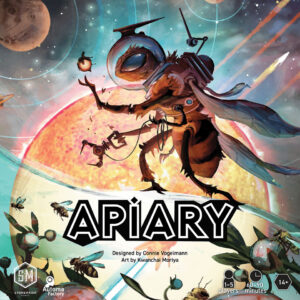 One of the most interesting things about modern board games is how innovation is often hidden behind unnecessary complexity. It seems that many new designs add mechanism after mechanism, most of which serve to unnecessarily bloat a game. (Vladimir Suchy—a good designer overall—is particularly guilty of this.) Sometimes, however, a game takes a few tried and true mechanisms, doesn’t change them all that much, and yet still combines them in a satisfying design.
One of the most interesting things about modern board games is how innovation is often hidden behind unnecessary complexity. It seems that many new designs add mechanism after mechanism, most of which serve to unnecessarily bloat a game. (Vladimir Suchy—a good designer overall—is particularly guilty of this.) Sometimes, however, a game takes a few tried and true mechanisms, doesn’t change them all that much, and yet still combines them in a satisfying design.
This is what Stonemaier Games’ Apiary is attempting to do. Is it successful? Don’t ask me, Dear Readers, I won’t find out until the end of the review just like the rest of you!
Apiary is for 1-5 players and is designed by Connie Vogelmann. It takes about 90 minutes to play.
Gameplay Overview:
For the most part, many of the things players do in Apiary will be familiar to experienced gamers. Each turn, players will take one of their bee worker meeples (the workers in this game are space bees—did I not mention that?) and put them out on an action space on the board. These spaces all do different things, but they are fairly familiar actions such as acquiring new tiles and/or cards for one’s tableau, grabbing end-game scoring bonuses, or snagging some of the game’s limited resources. (All of these things have bee-adjacent names because THEME. “Buzz Points,” “Stinger Supplies,” “Bee-Kind Bucks.” Stuff like that. (I made all of those up, but you get the idea.))

The game’s main twist on this worker placement stuff is that no spaces are ever truly blocked by opponents. Instead, when someone’s bee goes to a space with someone else’s bee, they bump said bee off the space. Sometimes this is just to a different slot in the same action, but eventually, that bee will be bumped off the action entirely. When this happens, the owner of that bee gets to decide if they want to take a regroup turn, which will produce a bunch of resources for them, or they can upgrade the bee, making it more powerful for a future round but forgoing the production bonus.
Players will do this throughout the game as they try to collect points via cards, filling up a hexagonal individual player board (the theme is a little confusing here… it’s like a bee space colony I guess?), and grabbing the coveted Carving hexes that are very expensive to acquire. There are also additional things players can do—such as exploring the galaxy with a giant Queen Bee spaceship (no Beyonce meeple, sadly)—but it all uses the same “push other people’s meeples” mechanism as its trigger.
At the end of the game, whichever swarm has the most points is the best collection of bees since Honey Buzz.

Game Experience:
Apiary is one of the rare games I allowed myself to get excited about before playing. (I’m usually jaded going into every game I play.). This is a risky proposition, but I’m happy to report that not only did Apiary not disappoint me, it actually exceeded my expectations.

All of the interactions are just very satisfying. Viticulture—for my money still the gold standard for “classic” worker placement—is similar in that dropping your workers on useful spots is lots of fun, but here you never have to worry about missing out entirely on an action. There is a calculation to be made if picking something will ultimately help your opponent, but no one is ever completely boxed out (unless they’re out of available bees, I suppose, but they always fly back to the space hive eventually).
This push and pull of action selection that benefits multiple players has been done successfully many times recently—Earth is a good example—but here it’s driven by worker placement, which is unique. It’s a rare thing where a Euro forces this type of interaction to advance the game; a player can choose to avoid all the occupied slots, but invariably that will slow their own game more than anyone else’s.
As I was playing the game for this review (including its exceptional solo mode), I was trying to think of a Euro game where the action is almost entirely driven by neutral player interaction and I couldn’t come up with one. I’m sure games like this exist, but Apiary definitely feels fresh without necessarily having any core elements that would be considered innovative.

Final Thoughts:
I picked Apiary as my top game of 2023 and I stand by that assessment. It’s a streamlined design that doesn’t get in its own way. It also has a quirky theme that actually makes sense. (Well…kinda. The bee stuff makes a little sense. I don’t know if the space stuff is a slam dunk. There’s no basketball sub-theme here either, so I’m not sure why I just mentioned “slam dunks.”) After playing it a few times, I found myself still thinking about it and revisiting the many ways I could have manipulated my bees to better position my strategy. For me, that’s a surefire sign that a game is successful.
Final Score: 4.5 Stars. Almost went even higher for this one; Apiary is a bee game that gets an A from me.
 Hits:
Hits:
• Great table presence
• Easy to teach and plays pretty quickly
• Unique, if odd, theme
• Fun player interaction
• Scales well
• Exceptional solo mode
Misses:
• Not many, although maybe the bees didn’t need to be in space?
Source: Board Game Quest





